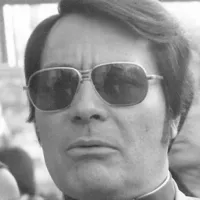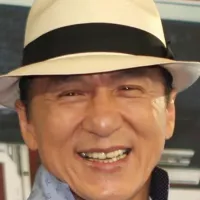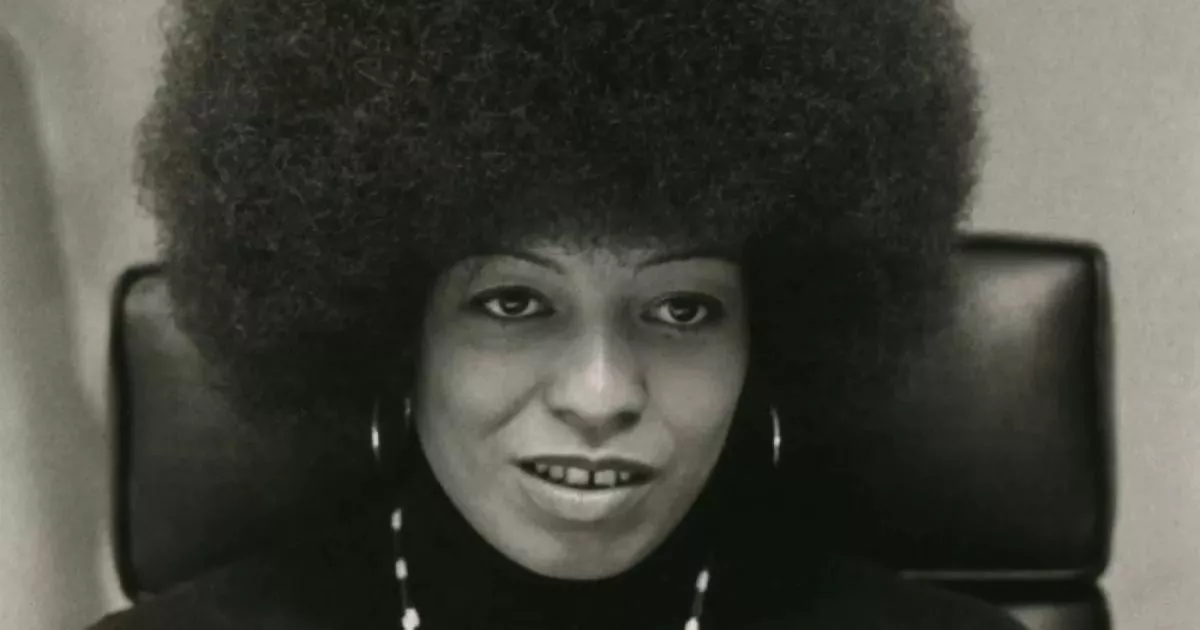Angela Davis is an American political activist, philosopher, academic, and author known for her work in civil rights and social justice. A former member of the Communist Party USA, she advocates for prison abolition, racial equality, and gender equality. She gained prominence in the 1960s and 70s through her involvement in the Black Panther Party and her own activism. Davis faced criminal charges in connection with a 1970 courtroom shooting, leading to a highly publicized trial and her eventual acquittal. She continues to lecture and write on issues of race, class, and gender, remaining a prominent figure in contemporary social and political discourse.
January 26, 1944: Angela Davis Born
On January 26, 1944, Angela Yvonne Davis was born. She is an American Marxist, feminist, political activist, philosopher, academic, and author.
1959: Girl Scouts National Roundup
In 1959, Angela Davis participated in the Girl Scouts national roundup in Colorado.
1962: Death of Reinhold Huhn
In 1962, Reinhold Huhn, an East German guard, was killed by a man trying to escape across the Berlin Wall with his family. Angela Davis later visited the Berlin Wall, where she laid flowers at the memorial for Reinhold Huhn.
1963: FBI Interview After Communist Festival
In 1963, Angela Davis returned home to a Federal Bureau of Investigation interview regarding her attendance at a communist-sponsored festival.
1963: Birmingham Church Bombing
In 1963, while in Biarritz, Angela Davis learned of the Birmingham church bombing, committed by the Ku Klux Klan, in which four black girls she knew were killed.
1965: Graduation from Brandeis
In 1965, Angela Davis graduated magna cum laude from Brandeis University and was a member of Phi Beta Kappa.
1968: Master's Degree from UC San Diego
In 1968, Angela Davis earned a master's degree from the University of California, San Diego.
1968: Joined Communist Party and Black Panther Party
In 1968, Angela Davis joined the Communist Party and became a member of the Black Panther Party, working with the Los Angeles branch where she directed political education. She retained her Communist Party membership while continuing to work with the Black Panther Party.
September 19, 1969: Fired From UCLA
On September 19, 1969, the Board of Regents fired Angela Davis from her position at UCLA due to her membership in the Communist Party, influenced by California Governor Ronald Reagan.
1969: Acting Assistant Professor at UCLA
Beginning in 1969, Angela Davis became an acting assistant professor in the philosophy department at UCLA, choosing it over Princeton and Swarthmore due to its urban location. She was known as a radical feminist, activist, a member of the Communist Party USA, and an affiliate of the Black Panther Party.
1969: Hired and Fired at UCLA
In 1969, Angela Davis was hired as an assistant professor of philosophy at UCLA. However, the Board of Regents fired her due to her membership in the CPUSA.
1969: Visit to Cuba
In 1969, Angela Davis was received by Fidel Castro as a member of a Communist Party delegation.
1969: The documentary "Angela Davis: Portrait of a Revolutionary" started filming
In 1969, filming started for the documentary "Angela Davis: Portrait of a Revolutionary" directed by UCLA Film School student Yolande du Luart. The documentary captured her life from 1969-1970.
June 20, 1970: Second Firing from UCLA
On June 20, 1970, Angela Davis was fired again from UCLA due to "inflammatory language" used in her speeches. The American Association of University Professors censured the board for this action.
August 7, 1970: Courtroom Takeover in Marin County
On August 7, 1970, Jonathan Jackson took control of a courtroom in Marin County, California, arming black defendants and taking hostages, leading to a shootout with the police.
August 14, 1970: Warrant Issued for Arrest
On August 14, 1970, a warrant was issued for Angela Davis's arrest in connection to the Marin County courtroom takeover. She was charged with aggravated kidnapping and first-degree murder in the death of Judge Harold Haley.
October 13, 1970: Capture by FBI
On October 13, 1970, Angela Davis was found by FBI agents at a Howard Johnson Motor Lodge in New York City after fleeing California as a fugitive. President Richard Nixon congratulated the FBI on capturing "the dangerous terrorist Angela Davis."
1970: PhD Work at UC San Diego
Around 1970, Angela Davis completed some work towards a PhD at the University of California, San Diego; however, she never received the degree due to the FBI confiscating her manuscripts.
1970: Guns Used in Courtroom Takeover
In 1970, guns belonging to Angela Davis were used in an armed takeover of a courtroom in Marin County, California, resulting in four deaths.
1970: The documentary "Angela Davis: Portrait of a Revolutionary" was filmed
In 1970, the documentary "Angela Davis: Portrait of a Revolutionary" was filmed by UCLA Film School student Yolande du Luart. The documentary captured her life from 1969-1970 and ended before the Marin County incident.
January 5, 1971: Declaration of Innocence
On January 5, 1971, Angela Davis declared her innocence before the court and the nation at Marin County Superior Court. John Abt was one of her attorneys.
February 1971: Movement to Release Davis
By February 1971, more than 200 local committees in the United States and 67 in foreign countries were working to free Angela Davis from jail. Black writers formed a committee called the Black People in Defense of Angela Davis. John Lennon and Yoko Ono contributed the song "Angela".
1971: Trial for Murder and Kidnapping
In 1971, Angela Davis faced trial for murder and kidnapping, with Margaret Burnham serving as her co-counsel.
1971: "Woman of the Year" in Time Magazine
In 1971, Angela Davis was listed as "Woman of the Year" in Time Magazine's "100 Women of the Year" edition.
1971: "Angela is Happening" play was written
In 1971, black playwright Elvie Moore wrote the play "Angela is Happening", depicting Angela Davis on trial with figures such as Frederick Douglass, Malcolm X, and H. Rap Brown as eyewitnesses proclaiming her innocence.
1971: CIA estimated Soviet propaganda efforts directed towards Angela Davis campaign
In 1971, the CIA estimated that five percent of Soviet propaganda efforts were directed towards the Angela Davis campaign, showcasing the international attention her case garnered during that time.
January 28, 1972: Garrett Brock Trapnell hijacked TWA Flight 2
On January 28, 1972, Garrett Brock Trapnell hijacked TWA Flight 2. One of his demands was Angela Davis's release, highlighting the high profile of her case at the time.
February 23, 1972: Release on Bail
On February 23, 1972, Angela Davis was released on $100,000 bail, paid by Rodger McAfee with the help of Steve Sparacino. The United Presbyterian Church contributed to her legal defense.
June 4, 1972: Acquittal Verdict
On June 4, 1972, after 13 hours of deliberations, the all-white jury returned a verdict of not guilty in Angela Davis's trial. A juror made the Black Power salute after the verdict.
August 1972: Honorary Doctorate from Moscow State University
In August 1972, Angela Davis received an honorary doctorate from Moscow State University.
August 1972: Davis visited the Soviet Union and received honorary doctorates
In August 1972, Angela Davis visited the Soviet Union at the invitation of the Central Committee, receiving an honorary doctorate from Moscow State University and another honorary degree from the University of Tashkent.
September 1972: Honorary Doctorate from Karl-Marx University
In September 1972, Angela Davis received an honorary doctorate from Karl-Marx University in Leipzig, Germany.
September 1972: Davis visited East Germany, met Erich Honecker, and received honorary degree
In September 1972, Angela Davis visited East Germany, where she met the state's leader Erich Honecker, received an honorary degree from the University of Leipzig, and the Star of People's Friendship from Walter Ulbricht. On September 11 in East Berlin she delivered a speech, "Not Only My Victory", praising the GDR and USSR and denouncing American racism.
1972: Davis depicted in "The Funerals of Togliatti"
In 1972, Angela Davis is depicted in Renato Guttuso's painting "The Funerals of Togliatti", among other figures of communism.
1972: Jiří Pelikán requested Davis to support Czechoslovakian prisoners
In 1972, Jiří Pelikán wrote an open letter asking Angela Davis to support Czechoslovakian prisoners. Davis refused, stating that "They deserve what they get. Let them remain in prison."
1972: Acquittal of Charges
In 1972, after being held in jail for over a year, Angela Davis was acquitted of all charges related to the courtroom takeover.
1972: International Speaking Tour
In 1972, after her acquittal, Angela Davis went on an international speaking tour, including a trip to Cuba where she was received enthusiastically.
1972: Documentary "Angela Davis: Portrait of a Revolutionary" was directed
In 1972, the documentary "Angela Davis: Portrait of a Revolutionary" was directed by UCLA Film School student Yolande du Luart. It follows Davis from 1969 to 1970, documenting her dismissal from UCLA.
1973: Davis led U.S. delegation to festival in East Berlin
In 1973, Angela Davis returned to East Berlin, leading the U.S. delegation to the 10th World Festival of Youth and Students, continuing her involvement in international events.
1974: Attended Second Congress of the Federation of Cuban Women
In 1974, Angela Davis attended the Second Congress of the Federation of Cuban Women.
1975: Solzhenitsyn criticized Davis for not supporting prisoners in socialist countries
In 1975, Aleksandr Solzhenitsyn criticized Angela Davis for not supporting prisoners in various socialist countries, given her strong opposition to the U.S. prison system, marking a notable ideological clash.
1975: Davis was a lecturer at the Claremont Black Studies Center
In 1975, Angela Davis was a lecturer at the Claremont Black Studies Center at the Claremont Colleges. Attendance was limited, and she taught in secret due to concerns from alumni benefactors about her Communist views.
1976: Marlene Warfield's character modeled on Davis
In 1976, the character Laureen Hobbs, portrayed by Marlene Warfield in the movie "Network", appeared to be modeled on Angela Davis.
September 10, 1977: Davis spoke to Peoples Temple members in Jonestown
On September 10, 1977, Angela Davis spoke via amateur radio to members of Jim Jones' Peoples Temple in Jonestown, Guyana, expressing support for their anti-racism efforts and claiming a conspiracy against them during the "Six Day Siege".
February 28, 1978: Davis wrote to President Carter regarding Jonestown
On February 28, 1978, Angela Davis wrote to President Jimmy Carter, asking him not to assist in efforts to retrieve a child from Jonestown, calling Jim Jones "a humanitarian".
1978: Davis taught at the San Francisco Art Institute
In 1978, Angela Davis taught a women's studies course at the San Francisco Art Institute, furthering her career in education.
May 1, 1979: Davis Awarded Lenin Peace Prize
On May 1, 1979, Angela Davis was awarded the Lenin Peace Prize from the Soviet Union. Later that month she visited Moscow to accept the prize, praising Vladimir Lenin and the October Revolution.
1980: Davis accepted Communist Party USA's nomination for vice president
In 1980, Angela Davis accepted the Communist Party USA's nomination for vice president, as Gus Hall's running mate.
1980: Davis became a professor at San Francisco State University
In 1980, Angela Davis became a professor of ethnic studies at the San Francisco State University, a position she held until 1990.
1980: Davis married Hilton Braithwaite
In 1980, Angela Davis married Hilton Braithwaite, marking a significant personal relationship.
1981: Returns to Germany to Continue PhD
In 1981, Angela Davis returned to Germany to continue working on her PhD.
1983: Davis divorced Hilton Braithwaite
In 1983, Angela Davis divorced Hilton Braithwaite, ending their marriage.
1984: Davis accepted Communist Party USA's nomination for vice president again
In 1984, Angela Davis accepted the Communist Party USA's nomination for vice president, as Gus Hall's running mate, for the second time.
1984: Davis continued teaching at San Francisco State University
In 1984, Angela Davis continued as a professor of ethnic studies at the San Francisco State University.
1990: Davis taught political science courses at San Francisco State University
In 1990, Angela Davis taught political science courses at San Francisco State University, continuing her academic career.
1991: Davis became a professor at UC Santa Cruz and Rutgers University
In 1991, Angela Davis became a professor in the History of Consciousness and the Feminist Studies departments at the University of California, Santa Cruz and Rutgers University, expanding her influence in academia.
1991: Davis left the Communist Party USA
In 1991, Angela Davis left the Communist Party USA, founding the Committees of Correspondence for Democracy and Socialism due to disagreements over the party's support of the 1991 Soviet coup attempt.
1991: Breaks from CPUSA, Joins UC Santa Cruz
In 1991, amid the dissolution of the Soviet Union, Angela Davis broke away from the CPUSA to help establish the CCDS. That same year, she joined the feminist studies department at the University of California, Santa Cruz.
1992: Davis was a visiting professor at Syracuse University
In the spring of 1992, Angela Davis was a distinguished visiting professor at Syracuse University.
1995: Davis opposed the Million Man March
In 1995, Angela Davis opposed the Million Man March, arguing that the exclusion of women promoted male chauvinism.
1995: Davis was Randolph Visiting Distinguished Professor of philosophy at Vassar College
In 1995, Angela Davis was the Randolph Visiting Distinguished Professor of philosophy at Vassar College.
1997: Davis came out as a lesbian
In 1997, Angela Davis came out as a lesbian in an interview with Out magazine.
1997: Co-founded Critical Resistance
In 1997, Angela Davis co-founded Critical Resistance, an organization focused on abolishing the prison–industrial complex.
2000: Davis formed the African American Agenda 2000
In 2000, Angela Davis, along with Kimberlé Crenshaw and others, formed the African American Agenda 2000, an alliance of black feminists.
2001: Davis spoke against the war on terror
In 2001, following the 9/11 attacks, Angela Davis publicly spoke against the war on terror, criticized the prison-industrial complex, and discussed the broken immigration system.
2003: Davis lectured at Agnes Scott College
In 2003, Angela Davis lectured at Agnes Scott College on prison reform, minority issues, and the ills of the criminal justice system.
2005: Davis commented on Hurricane Katrina
In 2005, in the aftermath of Hurricane Katrina, Angela Davis declared that the "horrendous situation in New Orleans" was due to the country's structural racism, capitalism, and imperialism.
2007: Television Interview on Herbert Marcuse
In a 2007 television interview, Angela Davis discussed the influence of Herbert Marcuse, stating that he taught her it was possible to be an academic, an activist, a scholar, and a revolutionary.
2008: Davis became a distinguished professor emerita
In 2008, Angela Davis became a distinguished professor emerita at the University of California, Santa Cruz and Rutgers University, marking a transition in her academic career.
2008: Retirement from UC Santa Cruz
In 2008, Angela Davis retired from her position as department director at the University of California, Santa Cruz.
October 2010: Davis was a visiting professor at Syracuse University
In October 2010, Angela Davis was a distinguished visiting professor at Syracuse University.
October 31, 2011: Davis spoke at Occupy Wall Street assemblies
On October 31, 2011, Angela Davis spoke at the Philadelphia and Washington Square Occupy Wall Street assemblies.
2012: Davis identified as vegan
At the 27th Empowering Women of Color Conference in 2012, Angela Davis identified as vegan and called for the release of Rasmea Odeh.
2012: Davis awarded the Blue Planet Award
In 2012, Angela Davis was awarded the 2011 Blue Planet Award for contributions to humanity and the planet.
2014: Davis returned to UCLA as a regents' lecturer
In 2014, Angela Davis returned to UCLA as a regents' lecturer, delivering a public lecture on May 8 in Royce Hall, where she had given her first lecture 45 years earlier.
2014: Davis maintained a relationship with CPUSA
In 2014, Angela Davis stated she continues to have a relationship with the CPUSA but has not rejoined.
2016: Davis received an honorary doctorate from California Institute of Integral Studies
In 2016, Angela Davis was awarded an honorary Doctor of Humane Letters in Healing and Social Justice from the California Institute of Integral Studies in San Francisco during its 48th annual commencement ceremony.
January 21, 2017: Davis was honorary co-chair of Women's March on Washington
On January 21, 2017, Angela Davis was an honorary co-chair of the Women's March on Washington, held the day after President Donald Trump's inauguration. Her involvement drew criticism.
October 16, 2018: Davis received honorary degree from Dalhousie University
On October 16, 2018, Dalhousie University in Halifax, Nova Scotia, presented Angela Davis with an honorary degree during the inaugural Viola Desmond Legacy Lecture.
2018: Prada features Davis T-shirt
In 2018, Prada featured a cotton T-shirt with Angela Davis's face on it in their collection.
January 7, 2019: BCRI rescinded Davis's Fred Shuttlesworth Human Rights Award
On January 7, 2019, the Birmingham Civil Rights Institute (BCRI) rescinded Angela Davis's Fred Shuttlesworth Human Rights Award, citing criticism of her support for Palestinian rights. However, on January 25, the BCRI reversed its decision and issued a public apology.
November 2019: Davis endorsed Jeremy Corbyn in the UK general election
In November 2019, Angela Davis, along with other public figures, signed a letter supporting Labour Party leader Jeremy Corbyn and endorsed him in the 2019 UK general election.
2019: Davis mural painted in Naples
In 2019, Italian street artist Jorit Agoch painted a mural featuring Angela Davis in the Scampia neighborhood of Naples.
January 20, 2020: Davis gave Memorial Keynote Address at University of Michigan's MLK Symposium
On January 20, 2020, Angela Davis gave the Memorial Keynote Address at the University of Michigan's MLK Symposium, honoring Martin Luther King Jr.'s legacy.
2020: Davis lived with her partner Gina Dent
By 2020, Angela Davis was living with her partner, the academic Gina Dent, advocating for the abolition of police and prisons, and for black liberation and Palestinian solidarity.
2020: Ms. Davis published in French
In 2020, "Ms. Davis" by Amazing Améziane and Sybille Titeux de la Croix, a graphic biography focusing on Davis's early years and trial, was published in French.
2020: Recognition in Time Magazine
In 2020, Angela Davis was listed as the 1971 "Woman of the Year" in Time magazine's "100 Women of the Year" edition and was also included on Time's list of the 100 most influential people in the world.
2020: Davis returned to Pomona College as a distinguished lecturer
In 2020, it was announced that Angela Davis would be the Ena H. Thompson Distinguished Lecturer in Pomona College's history department, marking her return after 45 years and highlighting her enduring influence in academic circles.
2020: Davis supported Joe Biden in the presidential election
In the 2020 presidential election, Angela Davis supported the Democratic nominee, Joe Biden.
2021: Davis elected to American Academy of Arts and Sciences
In 2021, Angela Davis was elected as a member of the American Academy of Arts and Sciences, recognizing her contributions to scholarship and public life.
2023: Salary equivalent in 2023
In 1969, Angela Davis' salary was $10,000, which is equivalent to $63,750 in 2023.
2023: Ms. Davis published in English
In 2023, "Ms. Davis" by Amazing Améziane and Sybille Titeux de la Croix, a graphic biography focusing on Davis's early years and trial, was published in English.
2023: Davis discovered her ancestry on "Finding Your Roots"
In a 2023 episode of the PBS series "Finding Your Roots", Henry Louis Gates revealed to Angela Davis that she is a descendant of William Brewster, a passenger on the Mayflower. She also discovered that Alabama politician John A. Darden, is Davis's grandfather.
Mentioned in this timeline

Donald John Trump is an American politician media personality and...

Joe Biden a member of the Democratic Party served as...
California is a U S state on the Pacific Coast...

John Lennon was a highly influential English singer-songwriter musician and...

Jim Jones was an American cult leader who founded the...
Nova Scotia is a province in the Maritimes region of...
Trending

2 months ago Analyst Upgrades Booking & Carvana; Google's AI Concerns Overblown, Says Bank of America

6 months ago Jackie Chan's Career, Lucy Liu's Western Flop, and Son Jaycee's Derailment Explored.
2 months ago December Social Security Payment Schedule: When to Expect Your Benefits in 2025

3 months ago Luigi Mangione, accused in CEO murder case, listens to Charli XCX and Taylor Swift in jail.

10 months ago Blizzard Celebrates Year of the Chicken in Hearthstone, Xbox Game Pass April Lineup

3 months ago Donna Vekic at WTA Chennai, Jones debuts, Parry Prediction, Chennai Open 2025
Popular

Thomas Douglas Homan is an American law enforcement officer who...

William Franklin Graham III commonly known as Franklin Graham is...

XXXTentacion born Jahseh Dwayne Ricardo Onfroy was a controversial yet...

Kristi Noem is an American politician who has served as...

Jupiter is the fifth and largest planet from the Sun...

Instagram is a photo and video-sharing social networking service owned...
